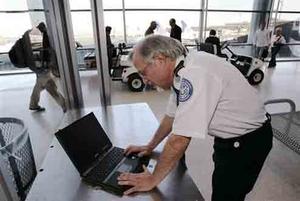Privacy vs. securityCan DHS seize -- and hold for months -- U.S. citizens' laptops?
On Friday, a federal judge heard arguments in a lawsuit that challenged the government’s right to search laptops, cell phones, and other electronic devices at the border and hold them indefinitely; civil liberties groups say the policy violates a travelers’ First Amendment right to free speech and the Fourth Amendment’s protection from unreasonable search and seizure; according to the civil liberties groups, more than 6,500 travelers have been subject to such search and seizure of their electronic devices from October 2008 to June 2010

DHS in court to defend electronic device seizures // Source: gawker.com
On Friday, a federal judge heard arguments in a lawsuit that challenged the government’s right to search laptops, cell phones, and other electronic devices at the border and hold them indefinitely.
According to the civil liberties groups, more than 6,500 travelers have been subject to the unlawful search and seizure of their electronic devices from October 2008 to June 2010.
In August 2009, DHS announced that it would continue the Bush administration’s policy of searching a traveler’s electronics at the border even if there was no evidence of illegal activities. The policy even allows border agents to share the entire contents of an individual’s hard drive or memory card with other government agencies.
For the most part, this policy has been upheld in courts, but privacy advocates and civil liberties groups say that the advent of technology that allows individuals to travel with massive quantities of personal data requires new rules and limitations to the law.
A 2006 3-0 ruling by the Ninth Circuit Court of Appeals saidborder agents could continue conducting random searches of electronic devices without warrants or probable cause. Border agents could even go so far as to hold the device for extensive computer forensic analysis.
“Under the border search exception, the government may conduct routine searches of persons entering the United States without probable cause, reasonable suspicion, or a warrant,” the judges said in their ruled.
In the past, former Senator Russ Feingold (D-Wisconsin) introduced legislation that would require border officials to have reasonable suspicion before they can search the electronic devices of U.S. citizens. In addition, devices cannot be held for more than twenty-four hours and agents would need to secure a warrant or court order after demonstrating probable cause.
